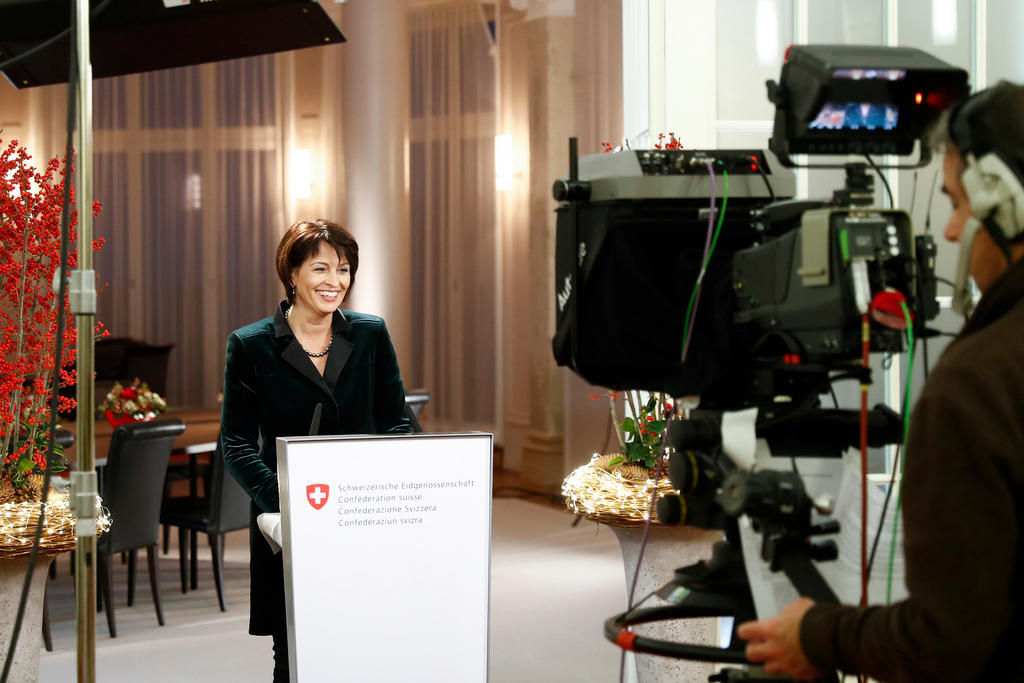
‘Switzerland is a rock in turbulent waters’

Switzerland is more successful than countries that practise censorship because its citizens can have their say and criticise the government, says Doris Leuthard, who holds the rotating Swiss presidency this year.
In an interview with swissinfo.ch, Leuthard adds that governments shouldn’t fear members of the public, but should inform and persuade them.
swissinfo.ch: This is your second time as president, having previously held the largely ceremonial role in 2010. Is the world today better or worse than seven years ago?
Doris Leuthard: At the moment I have the feeling that there are more issues that have got worse. Globally there are more conflicts and more people fleeing than ever before. One thing that’s better is that more people have been lifted out of poverty.
swissinfo.ch: What else has got worse apart from the refugee situation?
D.L.: Our relationship with the European Union is more tense. Europe has problems that are having an impact on our bilateral relations. We’re surrounded by a lot more uncertainty, for example Brexit or the policies of the new US president. One of my jobs will be to give the Swiss people a feeling of security, stability and direction. Switzerland is a rock in turbulent waters and must remain so.
swissinfo.ch: Is Brexit one of the things that has got better or worse for Switzerland?
D.L.: For me, it’s not a positive. A strong EU is important for Switzerland. The EU states are our most important trading partners. One has to respect that Britain is taking another path. It will be a very long time before the consequences are readily apparent. I do think it’s positive, however, that a discussion about the situation in the EU is being held and people are having to think about which reforms are needed. That’s not a bad thing for Switzerland because it shows that you have to let citizens get involved. Brussels will certainly have to grant concessions to individual member states so that the EU – and Europe as a whole – stays strong and stable.
swissinfo.ch: Switzerland has always been considered a country that stands for human rights, freedom and international law. Will Switzerland continue to promote these values abroad, or will economic interests increasingly take centre stage?
D.L.: Regarding the Geneva Conventions alone, we’re the land of human rights. Switzerland supports many, many international organisations – from the International Labour Organization and the International Committee of the Red Cross to the World Trade Organization – that reflect our values. That’s not going to change.
One challenge is the large migration flows around the world. We hope the Schengen AreaExternal link works and that countries show solidarity and take in people who really need help and protection – without asking about religion or country of origin.
But people who don’t have valid reasons for asylum according to our asylum laws and the Refugee Convention must leave our country. People who are persecuted and who temporarily need our protection should receive it, but leaving a country for economic reasons is not grounds for asylum.
swissinfo.ch: Brexit and the election of Donald Trump show that many people feel ignored by globalisation. Are there also such signs of dissatisfaction in Switzerland?
D.L.: When you talk to people, you do hear that. But the fact remains that the Swiss middle class has never been bigger. Only relatively few people depend on welfare. But obviously whoever’s affected isn’t going to be all sunshine and light.
If the business world continues to strive for openness regarding reforms, then it must take care of people, its employees. For example it must support them in further education so they can meet future developments in the world of work and thus have a chance in the job market.
Digitalisation makes a lot of people uncertain, it frightens them. The state is called upon here too. It must get involved to ensure that further education options are available so that people can acquire the necessary knowledge and skills to be able to meet the requirements of the workplace.
swissinfo.ch: In your New Year’s address for 2017 you looked to the future ‘with optimism and pride’. Are you also proud of the direct democracy with which Switzerland continues to create a stir abroad?
D.L.: Very. It’s not always easy for the cabinet. But experience shows for example that popular participation in financial issues results in less state debt and an attractive tax system. In Switzerland, citizens can have their say and criticise us. With this system we have more success than countries that practise censorship.
Democracy is a complicated system that has to be learnt. You can’t press a button and expect people to be perfectly informed immediately. I’d like referendums to be held in other countries too. One mustn’t fear voters, but inform them and convince them – that’s then a strong legitimation for the government.
Translated from German by Thomas Stephens

In compliance with the JTI standards
More: SWI swissinfo.ch certified by the Journalism Trust Initiative






























You can find an overview of ongoing debates with our journalists here . Please join us!
If you want to start a conversation about a topic raised in this article or want to report factual errors, email us at english@swissinfo.ch.